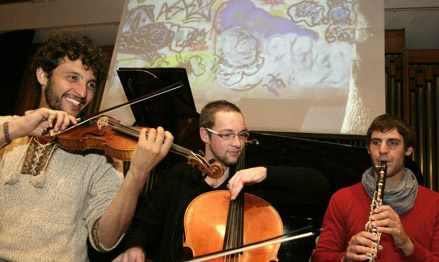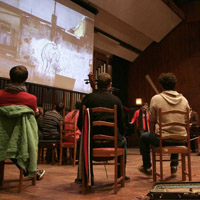Latest News Archive
Please select Category, Year, and then Month to display items
02 January 2025
|
Story Gerda-Marie van Rooyen
|
Photo Supplied
 Leading the research in South Africa is Prof Linus Franke from the Department of Soil, Crop and Climate Sciences.
Leading the research in South Africa is Prof Linus Franke from the Department of Soil, Crop and Climate Sciences.
Scientists are actively pursuing the successful breeding of diploid hybrid potatoes from inbred lines. This is expected to revolutionise potato breeding as it holds the key to rapid genetic progress. It will introduce new varieties for commercialisation through seed. Currently, existing potato variants have a gene that renders self-pollinated seeds infertile.
Prof Linus Franke, an academic in the Department of Soil, Crop and Climate Sciences at the UFS, is leading the research in South Africa. “This technology allows the production of genetically uniform potato seed that is easy to transport and largely disease-free.” He says this differs from conventional breeding whereby only vegetative propagation is possible due to tetraploid varieties in potatoes. It also risks carrying pests and diseases from one generation to the next – leading to the accumulation of pests and diseases with each round of multiplication.
Seed innovation
Prof Franke explains that Solynta BV, a seed company based in the Netherlands that produces potato varieties that can be grown from seed, has included South Africa in their research efforts because it is one of Africa’s largest producers and exporters. Through his academic relationship with Wageningen University and Research, a Dutch institution renowned for its agricultural endeavours and food production, the UFS became involved in researching hybrid potatoes grown from seed.
Diploid seeds containing two sets of chromosomes allow easier gene manipulation to increase predictability and speedier genetic progress. The breeding approach enables the incorporation of tolerance to pests, diseases, abiotic stresses (cold, heat, drought) and other desired genetic traits.
Although Prof Franke is optimistic about this research, he is not blind to disadvantages. “Potato seeds are tiny and have little energy reserves, making it harder to grow potatoes from seed than from tubers.” He says potatoes from seed will take longer to cultivate than tubers, as farmers need to grow plantlets from seeds first, adding six weeks to the growing period. “It is possible that commercial farmers can grow potatoes directly from seed. Alternatively, perhaps more likely, specialised growers will produce tubers of potatoes from seed; these tubers are then sold as seed tubers to other potato farmers, who then continue their normal practices of producing potatoes for the market from tubers.”
Financial benefits
Prof Franke says farmers have reason to get excited. “Seed potatoes will reduce input costs, as varieties with enhanced tolerance to pests and diseases require less pesticides. Planting one hectare of potatoes requires three to four tonnes of potato tubers, but only one 25 g packet of potato seeds.” Since potatoes are a more valuable commodity than maize, this technology might also increase farmers’ income potential.
‘Celebrating the music of our times’
2013-07-25
|
 |
| 25 July 2013 |
The Odeion School of Music’s (OSM) New Music Week, hosted from 17–20 July 2013, offered an experience of profundity.
This was the second week-long festival of its kind to be hosted by the OSM – last year the 90th birthday of the South African composer, Stefans Grové, was celebrated with concerts and a symposium. This year the New Music Week focused on the visit of Ensemble Trans-Z under the artistic leadership of former OSM student, Alfred Vorster, a composer living in Zürich. The Order of the Odeion School of Music was bestowed upon Vorster during the festival. The members of the ensemble are the Belgian pianist Lukas Huisman, Danré Strydom (currently an OSM doctoral student in clarinet, based in Ghent), the Argentinian violinist Juan Braceras and the Swedish cellist Karolina Öhman (both currently living in Basel, Switzerland).
The week included three lectures. Lukas Huisman elucidated his doctoral project, Alfred Vorster offered an analytical perspective on the work of Helmut Lachenmann and Hannes Taljaard (Potchefstroom) delivered a commentary on his own composition practice. In addition to presenting masters’ classes in their individual instruments, Ensemble Trans-Z also hosted two workshops – one for the Mangaung String Project and another for OSM students and staff. These workshops focused on creative improvisation practices within an avant-garde style.
composition practice. In addition to presenting masters’ classes in their individual instruments, Ensemble Trans-Z also hosted two workshops – one for the Mangaung String Project and another for OSM students and staff. These workshops focused on creative improvisation practices within an avant-garde style.
The highlight of the festival was two gala concerts that were held on 19 and 20 July. The first concert was hosted by Ensemble Trans-Z themselves, with a selection of compositions in the avant-garde style. The programme included challenging listening material and was creatively presented with unconventional lighting techniques and visual material.
The concert on 20 July consisted of New Music of a more conventional nature. The Odeion String Quartet offered a varied presentation which consisted of a rich mix of talent. OSM postgraduate students Marianne Cilliers, Karol Legierski and Eljee du Plooy formed part of this spectacular performance. The OSM flute lecturer, Handri Loots and the members of Ensemble Trans-Z supplied additional depth to the concert. The experience was made extra special by the recently-formed New Music Ensemble of the School of Music at the North-West University – led by Augusto Arias. Under conductorship of Jan-Moritz Onken, the OSM Camerata completed this impressive collaboration.
The Camerata’s recital of Hendrik Hofmeyr’s Phantom Waltz, which the composer newly arranged especially for this ensemble, was but one of the artistic highlights of an inspiring presentation.